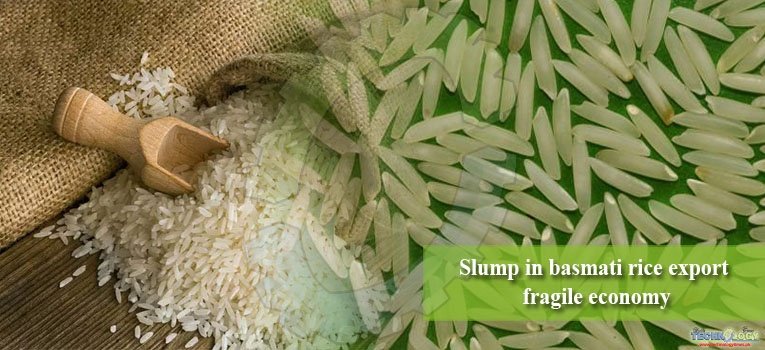A slump in the export of basmati rice is having a damaging effect on already fragile country economy. It has accelerated rural poverty with often damaging consequences for poor farmers.

The root cause of the fall of is complicated; both the provincial and national government is responsible for this. This basmati variety also has a huge role to play in eradication of poverty in rural Pakistan. Being mainly an export variety (with 60pc of its production going overseas at one time), it also fetches handsome amount of foreign exchange. All these factors make it too important for social and economic reasons to be not left it on the mercy of market force.
Today basmati rice is circled from a number of issues range from domestic marketing to export, it faces various problems. Ever increasing energy crisis and discouraging law and order situation in the country threatened export process like today never before. Export of basmati rice has go down up to 40% in the past four years as a result the locale market has been overwhelmed by an unmanageable glut, This result in the loss of basmati prices in the local market.
If this situation will remain continue there is a fear of further decline of domestic market price, which will discourage farmers from growing basmati. Key reasons for Pakistan to loss its international reputation is low yield, which have been stick at 25-30 mounds’ per acre. The variety of seed used in Pakistan is too old to withstand diseases and pest attack.
The public and private research institutes of the country so far could not develop a new variety that can increase yields. Electricity fluctuations also a prominent issue that increased the cost of production because some rice mills are operating at only half of their capacity and gas shortages makes the drying process difficult.
Law and order situation of port city Karachi is not that well to facilitate the goods transport. Pakistani export had already been faced ban by Russia, Mexico and Iran in recent years; these are due to adulteration and not fulfilling of quality protocol in the product being sold. The international market is the expansion of locale market, improving the quality in the domestic market is necessary to the development of exports.
Another big factor which Pakistan faces in the international market is the competition imposed by its traditional rivalry country by India, as Indian basmati rice. India is more organized and presently showing its hold on major markets in the world like Saudi Arabia, Iran, gulf and other European countries. While in Pakistan major exporters tries but show lack of consistent due to lower international prices, poor quality and lack of support from government to establish brand image.
Due to better planning of crop, smart economics and support of research institutions in India their crop enjoys leisure’s in the international market most of the time. However, on the counterpart great news for Pakistani exporter and farmer is that Pakistan could eat India’s basmati rice share in the international market, this can happen due to new regulation which is declared by the European Union spokesperson recently on the presence of hazardous pesticides in the commodity, said an official.
From January 1, 2018, “all countries that export basmati rice to the EU must bring down the maximum residue limit (MRL) level for Tricyclazole, a pesticide, to 0.01 mg per kg. Up till now, the EU was accepting 0.03 mg per kg from different countries, including India.
Pakistan could eat Indian share, Because Pakistani farmer do not use such chemicals to protect their crop. Indian farmers widely use these chemical and exporter fears that 95% of the Shipment will hit by this new regulation. Things are now going towards betterment however it seems the road is not so easy.
Government officials said that the exporters are painting a dark export picture otherwise the situation is not that bad. Iran’s ban will soon completely be lifted because only two Iranian provinces are allowed to grow rice which could not fulfill their domestic demand. Gulf is at present in financial crisis but on the ground reality the basmati consumer is still big enough and rich enough to help sustain imports from Pakistan.
Pakistani basmati rice has its popularity in the international market because of its unique taste and aroma and the world is ready to pay for this. Unfortunately poor market policies discourage the farmers from growing of basmati, this will diminish the area under rice cultivation ultimately will crave negative mark on country economy.
The ministries of research, finance, commerce and food security needs to put their head together and see how the locale market can be improved through mutual agreements, this issue must be solved by mutual cooperation, understanding and policy development by taking all stakeholder on board in the favors of the farmer and the country economy.
Authors: Muhammad Shafique Aslam*, Muhammad Ishfaq, Muhammad Hamza Latif, Shakeel Ahmad Anjum, Nadeem Akbar
Agro-Biology Lab, Department of Agronomy, University of Agriculture, Faisalabad.